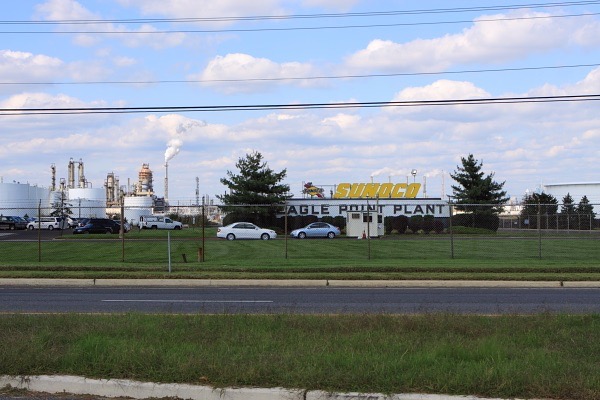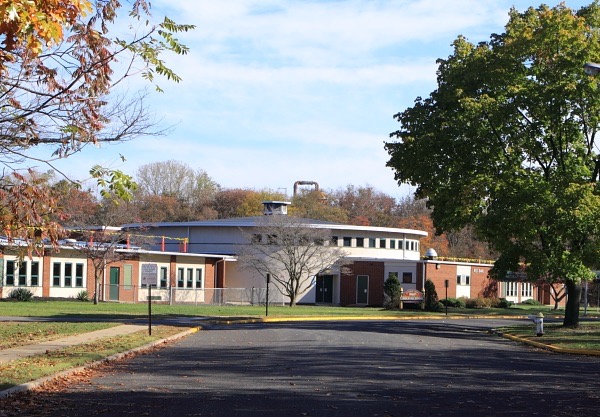Murphy DEP Renews Air Pollution Permit For Major Fossil Gas Power Plant – Permit Has No Limits On Greenhouse Gas Emissions
Facility Emits Over 1 MILLION TONS Of Greenhouse Gases – Emissions Increasing
DEP Permit extends reliance on fossil power
The Murphy DEP just renewed the air pollution permit for Eagle Point Power Generation LLC plant, located at 1250 Crown Point Rd, Westville, NJ 08093 (Gloucester County). The 237 MW plant consists of two cogeneration gas turbines (the plant is owned by politicly connected Rockland Capital, who also owns the BL England fossil plant, where DEP also ignored climate change and failed to impose any GHG emission limits. An April 29, 2013 BPU Order exempted the BL England from RGGI requirements to purchase allowances – multi-million dollar subsidy).
[Note: 8/20/19 – Cogeneration plants were exempted from the RGGI GHG emissions trading program under the RGGI law. The exemption was sponsored by Senator Sweeney. That giveaway and other loopholes prompted environmental groups to oppose the bill and many NJ newspaper editorials in opposition to the bill]
[Note: 8/22/19 – Jeff Tittel writes that the plant is no longer a licensed cogeneration plant.]
According to the basis for the DEP permit:
The Greenhouse Gas (GHG) emissions from this facility are 1,028,070 TPY CO2e and the GHG emissions increase is less than 75,000 TPY CO2e.
Despite Gov. Murphy’s repeated public statements about his commitment to address climate change and to reduce greenhouse gas emissions, the DEP rejected this opportunity to ratchet down on or phase out greenhouse gas emissions from fossil power plants. The Murphy DEP permit made no changes from the Christie DEP permit, with respect to reducing GHG emissions. Just the opposite: the Murphy DEP permit actually allows GHG emissions to increase 75,000 tons per year.
Despite emissions of over 1 million TONS of greenhouse gases – which are allowed to increase under the Murphy DEP permit renewal – the Murphy DEP permit does not regulate greenhouse emissions (see: NJ Environmental Regulations Ignore Climate Change)
The DEP adopted a regulation back in 2005 that classified greenhouse gas emissions as regulated “air contaminants” (air pollutants) under NJ State law. Despite this regulatory authority to limit greenhouse gas emissions, the DEP has refused to impose any restrictions on greenhouse gas emissions.
The NJ Global Warming Response Act, adopted back in 2007, mandates an 80% reduction in greenhouse gas emissions. DEP continues to ignore this law.
The DEP permit includes a “shield”, which protects the polluter from challenges for failure to control or reduce greenhouse gas emissions:
This operating permit also includes a permit shield, pursuant to the provisions of N.J.A.C. 7:27-22.17. A permit shield provides that compliance with the relevant conditions of the operating permit shall be deemed compliance with the specific applicable requirements that are in effect on the date of issuance of the draft operating permit, and which form the basis for the conditions in the operating permit.
The Eagle Point plant is also a major polluter for other traditional “criteria” and “hazardous air pollutants”:
The facility is classified as a major facility based on its potential to emit 247 tons per year of nitrogen oxide (NOx).
This permit allows individual hazardous air pollutant to be emitted at a rate to not exceed: 152 pounds per year of benzene, 73 pounds year of acrolein, 8071 pounds per year of formaldehyde and 36 pounds per year of polycyclic organic matter (POM).
Despite significant hazardous air pollutant emissions and the proximity of dense population – including sensitive receptors like schools and hospitals – the DEP found that health risks were “negligible”:
Health Risk Assessment was conducted as part of the review of this permit application and health risk was determined to be negligible consistent with NJDEP Technical Manual 1003.
The Murphy DEP permit actually weakens the Christie permit conditions, including these “significant modifications”:
- DEP extend the deadline for compliance with performance testing requirements
- DEP weakened the restrictions on TSP by allowing averaging of stack emission tests
- DEP weakened the carbon monoxide emissions monitoring by allowing averaging
- DEP allowed the polluter to add NEW FOSSIL (oil) backup power fuel
- DEP allowed the polluter to install a second steam generator
DEP also made minor improvements to the permit, reducing the allowable NOx and particulate emissions.
I have not adequately researched the permit process, but I would bet that (readers, please correct me if I’m wrong):
1) the DEP didn’t not hold a public hearing in the community and the community was not made aware of the opportunity to comment on and force changes to this permit;
2) NJ environmental groups did not submit comments opposing this permit renewal or otherwise pressure the Murphy DEP to regulate greenhouse gas emissions from the plant;
[Update: this comes at a time when the “Empower NJ” campaign is pressing Gov. Murphy to impose a moratorium on new fossil infrastructure. This DEP permit exposes key flaws in that campaign, i.e. 1) a failure to address existing fossil infrastructure. which must be phased out; and 2) failure to understand and follow the regulatory arena and hold the Murphy DEP accountable. ~~~ end update]
3) there was no media coverage of the permit or the regulatory issues and missed opportunities I highlight above; and
4) there was no legislative oversight or concerns expressed about allowable GHG emissions.
The regulatory system in totally broken.
We warned legislators about that and urged that they conduct oversight during DEP Commissioner McCabe’s Senate confirmation hearing:
… 11. Will Gov. Murphy & DEP incorporate climate change reviews, backed by enforceable standards, retrofit requirements, and offsets, to meet the emission reduction goals of the Global Warming Response Act in all land use, infrastructure, air quality, and water resource permits? ”’ […]
31. Will the Murphy DEP adopt new rules to mandate risk assessment – based on cumulative risk to the most vulnerable populations – and more stringent “advances in the art” (NJ’s legal standard) air pollution controls for Hazardous Air Pollutants (HAPs)
We again explained that and called for reforms at the outset of the Murphy administration (see: Murphy DEP Again Maintains Continuity With Christie DEP Policy):
The Murphy administration reforms must inform and involve the public, ratchet down on greenhouse gas emissions, and reduce public health risks of hazardous air pollutants and catastrophic chemical risks (and what ever happened to toxics use reduction through the Pollution Prevention Act? )
The DEP is broken, perhaps beyond repair.
Gov. Murphy and DEP Commissioner McCabe are not serious about addressing climate change and reducing greenhouse gas emissions to avoid climate catastrophe.

